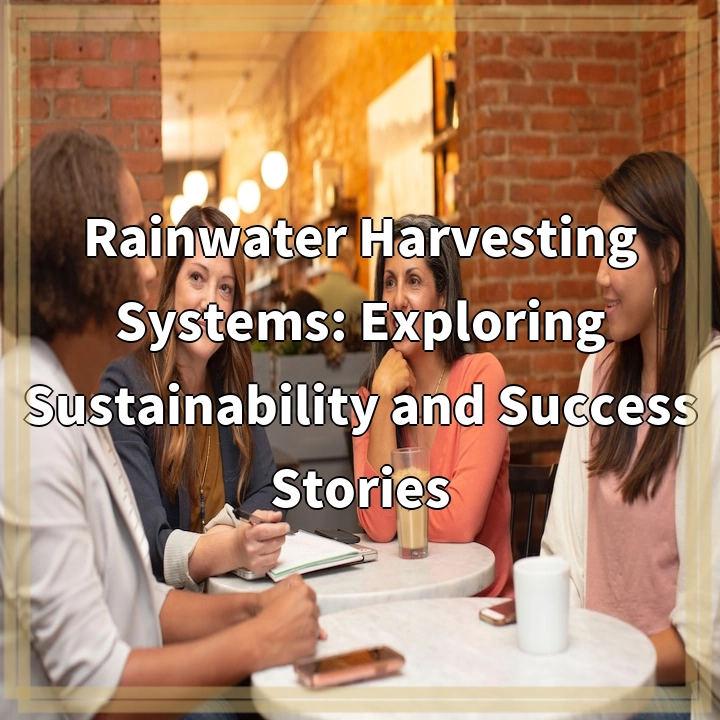Physical Address
304 North Cardinal St.
Dorchester Center, MA 02124
Physical Address
304 North Cardinal St.
Dorchester Center, MA 02124

Rainwater harvesting systems are sustainable solutions that allow the collection and storage of rainwater for various uses. It involves capturing rainwater from rooftops, land surfaces, or other catchment areas and directing it into storage tanks or underground reservoirs for future use. This system can be implemented in residential, commercial, or industrial settings, providing a reliable source of water while minimizing reliance on traditional water sources.
1. Water Scarcity:
One of the key issues driving the adoption of rainwater harvesting systems is the increasing water scarcity in many regions. Traditional water sources, such as rivers and groundwater, are facing depletion due to overuse and climate change. Rainwater harvesting helps to alleviate pressure on these sources by utilizing rainwater as an alternative supply.
2. Urban Runoff and Flooding:
Rapid urbanization has led to increased surface runoff, as paved areas prevent rainwater from infiltrating into the ground. This runoff can cause flooding and carries pollutants into water bodies, further degrading water quality. Rainwater harvesting systems can help mitigate urban runoff by capturing and storing rainfall, reducing the volume of runoff and alleviating flood risks.
3. Water Contamination:
Traditional water sources are susceptible to contamination from various sources, including industrial pollutants, agricultural runoff, and sewage overflow. Drinking contaminated water poses serious health risks. Rainwater harvesting systems provide a decentralized and self-contained water supply, reducing the potential for contamination and improving water quality.
4. Drought Resilience:
Droughts are becoming more frequent and severe in many parts of the world. Rainwater harvesting systems offer a reliable water source during periods of drought, helping communities, farms, and industries maintain water availability for essential needs.
5. Energy Consumption:
Conventional water supply systems require significant energy inputs for the treatment, pumping, and distribution of water. Rainwater harvesting systems, on the other hand, require minimal energy for collection and storage, making them a more sustainable and energy-efficient water solution.
6. Financial Benefits:
Implementing rainwater harvesting systems can result in cost savings for users. By reducing reliance on municipal water supplies, individuals and businesses can potentially reduce their water bills over time.
7. Education and Awareness:
Despite the many benefits of rainwater harvesting, there is still a lack of awareness and understanding among the general population. Promoting education and awareness about the effectiveness and feasibility of rainwater harvesting systems can help drive their wider adoption.
There are several solutions that can address the real-world problems associated with rainwater harvesting systems:
1. Water Scarcity:
By implementing rainwater harvesting systems, communities and individuals can reduce their reliance on traditional water sources and help alleviate water scarcity. Encouraging the widespread adoption of rainwater harvesting can contribute to better water management and sustainability.
2. Urban Runoff and Flooding:
Rainwater harvesting systems can help mitigate urban runoff by capturing and storing rainfall. This helps to reduce the volume of runoff and minimize the risk of flooding. Implementing green infrastructure, such as permeable pavements and green roofs, can also contribute to managing stormwater and preventing runoff.
3. Water Contamination:
By utilizing rainwater harvesting systems, communities can have a decentralized and self-contained water supply, reducing the potential for contamination. Proper maintenance and regular testing of the stored rainwater can further ensure its quality and safety for various uses.
4. Drought Resilience:
Rainwater harvesting systems offer a reliable water source during drought periods. By storing rainwater during wet seasons, communities, farms, and industries can maintain water availability for essential needs, reducing their vulnerability to drought impacts.
5. Energy Consumption:
Rainwater harvesting systems require minimal energy inputs compared to conventional water supply systems. By promoting the use of rainwater, communities can reduce energy consumption associated with treating, pumping, and distributing water, thus contributing to sustainability and energy efficiency.
6. Financial Benefits:
Implementing rainwater harvesting systems can result in cost savings in the long run by reducing reliance on municipal water supplies. Individuals, businesses, and institutions can potentially lower their water bills and achieve financial benefits over time.
7. Education and Awareness:
Promoting education and awareness about the benefits and feasibility of rainwater harvesting systems is crucial. This includes creating outreach programs, providing information to the public, and implementing policies that encourage the adoption of rainwater harvesting at various scales.
Rainwater harvesting systems provide sustainable solutions to address water scarcity, urban runoff, water contamination, drought resilience, energy consumption, and financial benefits. Promoting education and awareness about these systems is essential for their wider adoption and effective implementation.
If you’re wondering where the article came from!
#